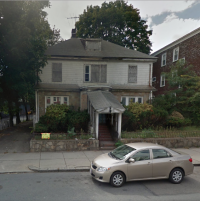May 26, 2016

Boston's list of distressed properties is a few Dorchester homes lighter this year. Two properties in the neighborhood are headed toward rehabilitation and refurbishment, according to the Department of Neighborhood Development (DND).
The DND conducts an annual survey of residential, industrial, or commercial buildings with visible signs of neglect and no occupancy. Though the number of distressed buildings has declined 85 percent since 1997, and 16 percent since 2013, the 2015 report found that of the 123 distressed residential properties in Boston “the majority (70 percent) of distressed residential buildings are concentrated in three neighborhoods: Roxbury, Dorchester, and Mattapan.”
The survey draws from past surveys, residential complaints, fire reports, and the Inspectional Services Department’s Project Pride, which secures dangerous buildings. Officials note that there are likely more distressed buildings across the city than are reflected in the survey.
In reducing the number of distressed properties, Boston has multiple resources to encourage responsible developers to rehab the lots. DND publishes a list of such properties to allow developers to purchase them. In certain cases, the department has also provided funding, project management, and technical assistance to private building owners and developers in order to renovate and redevelop distressed buildings.
The Neighborhood Homes Initiative, which aims to expand affordable homeownership, is part of Mayor Martin Walsh’s Boston 2013 Housing Plan. Through the initiative, DND expects that 200-300 home sites will be made available over the next three years.
One of the residential properties in Dorchester to be taken off the list, 139 Stoughton St. in Uphams Corner, was headed toward development last week. The delapidated building used to be a city-owned property and has recently been transferred to Ecazu Development as part of the Neighborhood Homes Initiative, according to Lisa Pollack with DND.
The house suffered “extensive damage to the interior of the property, requiring a gut rehabilitation of the property,” according to a city report. DND set a floor price of $20,000 for the 5,286- square-foot property, noting, “A reasonably efficient developer should be able to acquire the property at this price, complete the renovations as specified, and make a reasonable profit.”
Another Dorchester property removed from the list this year, a two-family house at 29-31 Mt. Everett St., was completely gutted, according to the city. A Request for Proposals released on March 28 for the lot reads: “NHI Buildings are to be fully renovated to DND specifications and sold to a middle-income homebuyer. To achieve this objective, the target end sales price to the end buyer of the rehabbed two-family home is $435,00. The property will bear an Affordable Housing Restriction on both the owner’s unit and the rental unit.”
According to city data, the number of properties the city has declared distressed has decreased greatly over the past 17 years. In 1997 there were more than 1,000 properties on the list, nearly 800 of which were residential. In 2015, the city declared 210 properties as distressed, including 121 residential properties.
Though 13 properties in Dorchester left were classified as no longer distressed in the 2015 report, 12 new properties, including two commercial spaces, in Dorchester were added to the list in the same report.
“With 49 percent of its buildings identified as distressed within the last two years, Dorchester has the highest percentage of newly distressed buildings,” according to the 2015 report.


